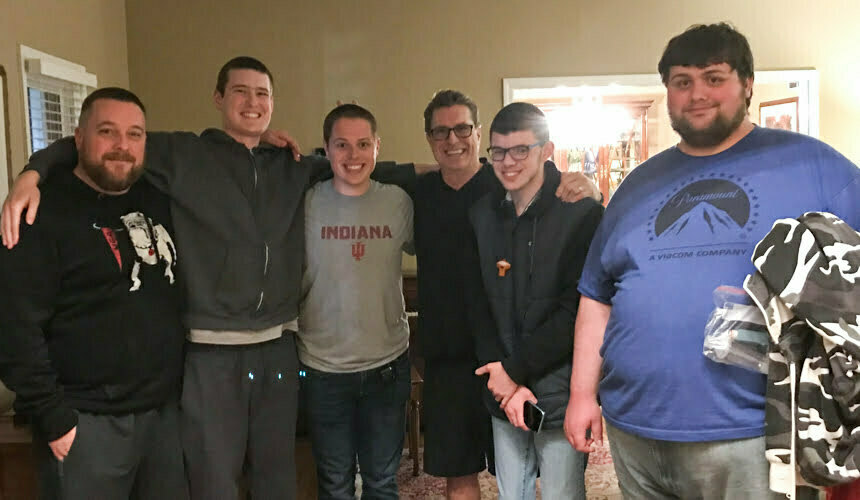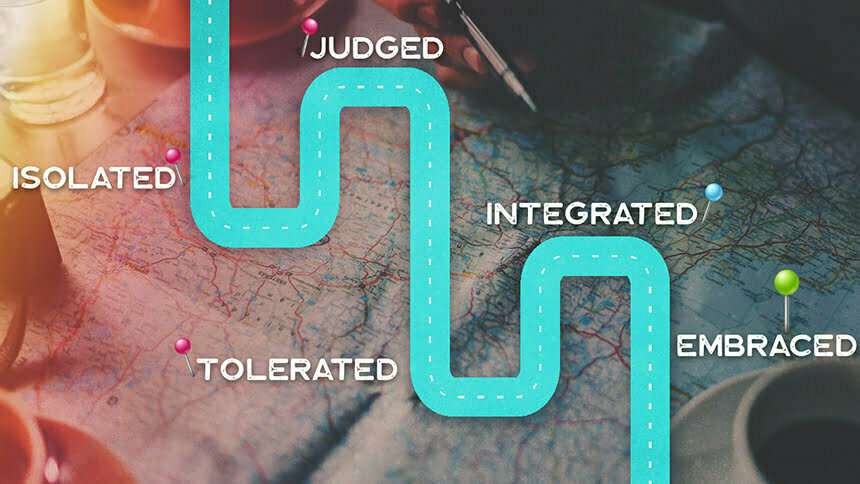

Over the past several years I have been involved in a variety of ways, volunteering with the disability ministry at our church, Southeast Christian. One of the most impactful opportunities has been getting to know many of the young men affected by disability at my church. What initially began as me serving quickly turned into developing genuine friendships.
At a gathering earlier in the year, our “guys group” met up to hang out and catch an event on TV. This was my first time getting to really hang out with my friends outside of church, so I was really looking forward to it. Plus, I knew we would have plenty of pizza and cupcakes, and what event is not fun with those, right?
After the night was over, a few thoughts hit me as I was heading home. None of these thoughts would have come to me a few years ago before volunteering in disability ministry but I felt that they were worth sharing here.
At least twice, I was mistaken for a parent. I might attribute this to me being a new face around some of the guys, however, I think it was more commonplace for a family member or parent to drop someone off and then leave. Nobody ever assumed that I was just their friend and I was there to hang out with my bros. Even at the end of the night when everyone wanted to take a group photo, most of the parents did not think to include me.
I was the only person there to hang out with this group that did not actually have a disability. Many years ago, this would have been enough reason for me to skip out, to create some excuse about why I could not be there and leave the event to someone else to handle. But these are my dudes. I can be myself when I am with them. Normally the question I see asked is, “Why are those affected by disability not accepted?” yet on this night, I was left wondering why the group was not more diverse. Inclusion is such a powerful concept when applied properly. I do not believe that it can only be including those with disabilities. I believe those WITHOUT disabilities must also enter the world of those WITH disabilities and spend time in “their world” too.
As someone without a disability, I was almost expected to leave as soon as I got there. I was told, “You can hang around if you want.” I looked at the guy puzzled because I was there to hang out, not just drop off someone and then leave.
The family hosting our guys event lives literally in another state. They are about 30 minutes from our church. The mother told me that they drive to our church primarily because there are more opportunities for their son to make friends there. I instantly thought about the number of churches that this family might pass on their drive that are far closer to home that are missing out on reaching this family. How many churches are within a shorter drive from their house but have zero intentional disability outreach? This might sound harsh, but I just cannot see how these churches are complete without my friends.
I used to think growing up that if I wanted to really serve in God’s kingdom that meant I would have to go overseas to another country and volunteer. It was not until a few years ago that I found serving opportunities in my own town. I did not have to look to another country. As a matter of fact, I had to look less than 2 blocks from my own house. One of the guys in our group lives in the same subdivision. I was able to swing by, pick him up, and have great conversation to and from the event.
This was not a single night of “charity” or “ministry” either. These are my friends. When the Coronavirus was forcing cities and states to lockdown, forcing families to isolate, I will be the first to admit that I had a really hard time with it. Despite feeling as if I am an introverted person by nature, it was not easy to be alone. Thankfully, my friends checked in on me. I can think back quite clearly to some dark days when I would get a text or Facebook message and instantly feel better. I cannot imagine trying to go through what I did without my friends who took the time to check up on me.
What kind of ministry do I want to be involved with? The one where my friends are.

This experience brought to mind the “Pathway from Isolation to Embrace” series of blogs that Ryan Wolfe wrote. Far too often, those affected by disability are isolated without opportunities for true friendship and ministry. Too many affected by disability are left in isolation and sadly that is where their pathway ends. Those that traverse the pathway that Ryan describes move from being isolated to being judged, tolerated, integrated, and hopefully embraced.
As we have found through this entire experience with a global pandemic, the church is not just the building. The church is us. It is you. It is me. Church is anywhere and everywhere that we make it. This means that the pathway from isolation to embrace is not limited to the traditional church walls.
Church leaders and members have been given unique insight into what it is like to be isolated and what it is like to reach people who have been stuck in isolation. If this can happen when church doors are open, it is magnetized when the doors are closed. And for some, those doors are always closed, even when they are open if you understand where I’m coming from.
My challenge when reading this is to think of the end goal along this pathway. What does it truly mean to “embrace” someone with disabilities? The embrace should not only happen during a Sunday service. If the “embrace” is only happening at church, then chances are you are not as far along the pathway as you might think.
“It is a step beyond inclusion. It means that you are missed when you aren’t there. It means you have reached a state of belonging.”
That feeling of belonging is what I felt when I was hanging out with my friends. I look forward to the next time I get to see them. I miss the joking. I miss making fun of each other. I miss the laughter. I cherish the camaraderie. I felt a bond with my friends that I probably will never be able to fully explain.
You see, when it comes to that pathway, my friends have allowed me to travel through it much quicker than I had ever imagined. They did not need to judge me, tolerate me, or integrate me. I was immediately embraced faults, and all. No questions asked.
Pathway From Isolation to Embrace Series:


